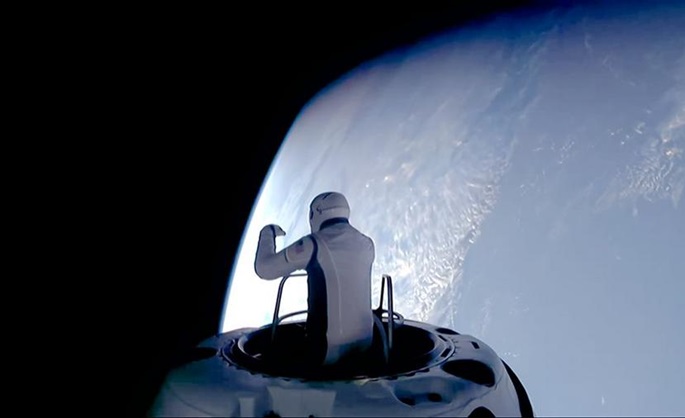U.S. astronauts complete 1st commercial spacewalk
Published : 13 Sep 2024, 02:57
The crew of U.S. Polaris Dawn mission completed a spacewalk on Thursday, marking the first time commercial astronauts have space-walked from a commercial spacecraft, according to SpaceX, reported Xinhua.
The 106-minute spacewalk officially began at 6:12 a.m. Eastern Time (1012 GMT) when suit pressurization started, nitrogen purge was initiated, and pure oxygen was flowing into the suits.
Two astronauts of the four-member all-civilian crew wore the SpaceX newly-designed extravehicular activity suits for the spacewalk at 732.2 km above Earth.
The two astronauts are American billionaire entrepreneur and Mission Commander Jared Isaacman, and SpaceX engineer and Mission Specialist Sarah Gillis.
Jared and Gillis separately exited the spacecraft and individually performed a series of suit mobility demonstrations to test the performance of the spacesuit in the vacuum environment of space.
The other two astronauts, Mission Pilot Kidd Poteet and Mission Specialist Anna Menon, remained seated, managing suit umbilicals and monitoring vital support systems and telemetry on Dragon's displays.
Isaacman and Gillis each spent several minutes outside the capsule. The spacewalk ended at about 7:58 a.m. (1158 GMT).
Upon completion of their individual extravehicular activities, the hatch was closed, Dragon re-pressurized and cabin oxygen and pressure levels confirmed, officially completing the suit testing alongside the first commercial spacewalk and the first spacewalk from a Dragon spacecraft, according to SpaceX.
SpaceX launched the new fully-commercial human spaceflight mission on a Dragon spacecraft from NASA's Kennedy Space Center in Florida on Tuesday.
The spacecraft traveled to a distance of 1,400 km above Earth on Wednesday -- the farthest humans have traveled since the Apollo program over 50 years ago, according to SpaceX.
The crew are also scheduled to conduct science during their multi-day mission to orbit, including essential health and human performance research for NASA's Human Research Program.
The research will help NASA scientists better understand how exposure to space conditions affects the human body. The crew will test new medical approaches and technology on telemedicine capabilities, gather data on space motion sickness, and better characterize flight-associated injury risks, according to NASA.


